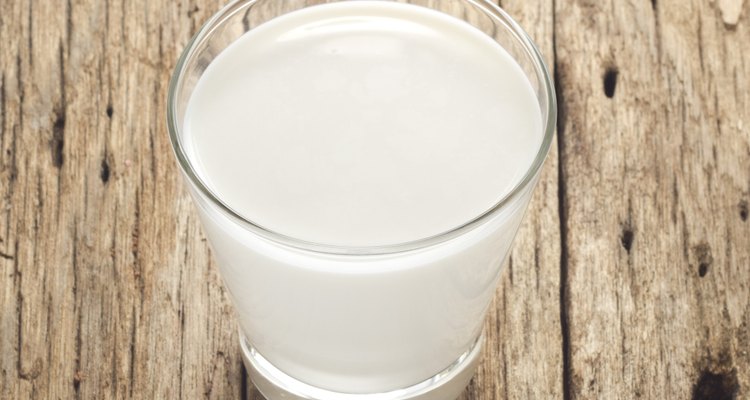
ipopba/iStock/Getty Images
Milk supplies your body with a variety of important nutrients. In its natural state, cow’s milk contains fat, carbohydrates and protein. All these nutrients contain calories, the units of energy that your body uses for fuel. An excess of calories leads to weight gain. Nonfat dairy products are less fattening than those that contain whole milk.
Calories
When it comes to controlling your weight, calories in liquid beverages matter just as much as the calories you consume from solid food sources. Fats supply your body with about 9 calories per gram, while both carbohydrates and proteins supply about 4 calories per gram. These substances in milk can make this beverage fattening, depending on the type and amount you drink. Drinking too much milk can add an excessive number of calories to your daily intake, increasing your risk of weight gain.
Whole Milk
Whole milk is more fattening than nonfat milk due to its higher fat content. With almost 8 grams of fat, 1 cup of whole milk contains 149 calories. Slightly more than half of the fat calories are in the form of saturated fatty acids, while the rest are from monounsaturated and polyunsaturated acids. One cup of whole milk also provides about 8 grams of protein and 12 grams of carbohydrates.
Nonfat Milk
Removing the fat particles from whole milk results in nonfat milk, a beverage that provides fewer calories. One cup of nonfat milk contains 83 calories. Although this processed dairy product contains only 0.2 grams of fat per 8-ounce serving, it still has calories from protein and carbohydrates. Like whole milk, a single cup of nonfat milk still contains about 8 grams of protein and 12 grams of carbohydrates.
Precautions
If you are trying to lose fat or maintain your weight, keep track of the calories in your drinks as well as those in your meals and snacks. Cut back on dairy fat by choosing nonfat milk rather than whole milk dairy products. Adults should drink no more than 16 to 24 ounces of milk per day, according to MayoClinic.com.
Related Articles
Can Adults Drink Whole Milk?

Calories in a Bowl of Raisin Bran Cereal
Nutrition Information for Onken Yogurt
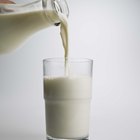
Whole Milk Vs. Lactaid Milk

Calories in Cheese Cubes

Milk Protein for Skin Care

Can I Dilute Whipping Cream to Sub Milk?

Cold Milk for Weight Loss

How to Purchase Milk Crates

How Many Calories Are in 1 Tablespoon ...

Bodybuilding and Losing Fat With Skim ...
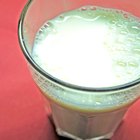
How to Make a Cinnamon Milk Face Mask

The Amount of Lactose in Yogurt

Nutrition Information on Blueberries

Cappuccino Nutrition Information
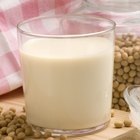
Is Soy Milk Casein-Free?

How to Freeze Tzatziki

The Average Weight of a Boiled Egg
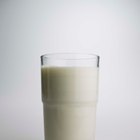
How to Cook With Lactaid

Alkaline Diet & Protein Foods
References
Writer Bio
Laura Wallace Henderson, a professional freelance writer, began writing in 1989. Her articles appear online at Biz Mojo, Walden University and various other websites. She has served as the co-editor for "Kansas Women: Focus on Health." She continues to empower and encourage women everywhere by promoting health, career growth and business management skills.
Photo Credits
ipopba/iStock/Getty Images